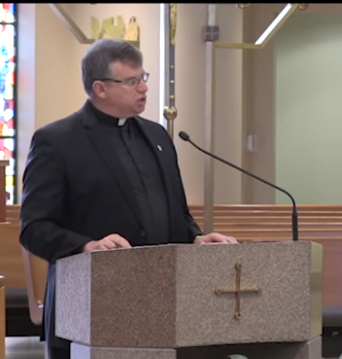 In “Are You Lonesome Tonight?” – Holy Saturday Father Pat Griffin continues his series of reflections
In “Are You Lonesome Tonight?” – Holy Saturday Father Pat Griffin continues his series of reflections
Holy Saturday reminds me of one of my favorite Elvis songs, one actually written by him, “Are You Lonesome Tonight.” I find the words touching and filled with an element of truth. I especially like the first part:
Are you lonesome tonight? Do you miss me tonight?
Are you sorry we drifted apart?
Does your memory stray to a brighter sunny day?
When I kissed you and called you sweetheart?
Do the chairs in your parlor seem empty and bare?
Do you gaze at your doorstep and picture me there?
Is your heart filled with pain? Shall I come back again?
Tell me dear, are you lonesome tonight?
Lots of lonely people live in our world and this song can capture something of their sense of loss and separation. (One might also look to Psalm 88 and the way in which it communicates the isolation of the sick.) The connection is far from perfect, and I would never insist that you use this song during your prayer on Holy Saturday, but one can argue that it has a genuine connection to the spirit of the day.
For many of us, Holy Saturday is the time between Good Friday and Easter Sunday during which we prepare for the great event of our faith. And so, we get our clothes together, prepare the readings, decorate the Church, and make sure that our menu is in order. None of these actions are bad, and all the arrangements are necessary, but perhaps we need to allow the spirit of the day a little more consideration.
What was that Saturday like for the apostles who had shared Jesus’ life for the past few years? They had not been the best of friends for him in these last days, and so what was their thinking on this day? How about the disciples and holy women who had followed Jesus and provided for his needs during his public ministry? The master and teacher upon whom they had cast their hope was now taken from them, where were they to go? What about Mary? Where was her heart on this day? Let me sum up their situation and feelings in one word: loneliness. They were lonely on this Saturday before Easter which we have come to call “holy.”
Why do we call this day “holy?” Let me admit immediately that I do not know historically why we do this. I am also not inclined to do the research to find out—though I may ask some people who are knowledgeable. My bet is that the question of name spurred the response: what else shall we call it? It is the day between the death of the Lord and his glorious resurrection. How else could it be named but “Holy Saturday?”
Let me suggest another answer. The day is holy because of the experience of loneliness.
In that first Holy Week, everyone remembered Jesus and realized that they would never see him again. The one who had been at the center of their lives and hopes was now forever gone and they missed him. The feeling of loneliness would have driven them together to feel some comfort or, perhaps, share their pain. (It should be no surprise that the resurrected Lord finds them huddled together in a locked room.) Perhaps they were not yet ready to tell each other stories about Jesus, but he was on the mind of each of them. He would never be with them again, and they were lonely. (I will not even attempt to say something about the spirit of Mary. It seems so impossible.) The sorrow and isolation of Holy Saturday could only prepare them for the great miracle which was about to be worked in their midst.
Loneliness should be part of our Holy Saturday as well. We need some quiet time alone during which we are aware of how much we miss Jesus. We should long for him to be with us in the Eucharist which we are denied. Despite all the action of the previous days, and the anticipation of the coming one, Holy Saturday has an emptiness. There is a sense of expectation, a waiting. Something is missing, but is coming. We are lonely till it arrives.
This sense of separation and isolation should be our real preparation for Easter. As we approach the vigil, we should long for the lighting of the Easter fire and the procession into the place where the Lord will be with us. The readings of Easter—yes, all of them—should be heard with an ear which recognizes that Jesus comes. Our loneliness will be erased by the divine presence: the joy of Easter. Soon, the Lord will promise us that he will be with us until the end of time. We will never be alone again. So, we may legitimately ask ourselves on Holy Saturday, “Are you lonesome tonight?”







0 Comments